Most of the things I learned during the past three months are practical, but fun, things I want to remember for future years. Here are a few personal lessons, in no particular order:
- When the yellow-bellied sapsuckers appear in the neighborhood, ruby-throated hummingbirds soon will be on their way. I can't remember where I first read this, but according to BirdNote, the first hummingbirds traveling north each spring follow the sapsuckers. The hummingbirds take advantage of the woodpeckers' sapwells when the supply of flowering plants is still light in the north. After reading this, I put my feeders out a little earlier this year, although the hummingbirds didn't show up until a few weeks after the sapsuckers.
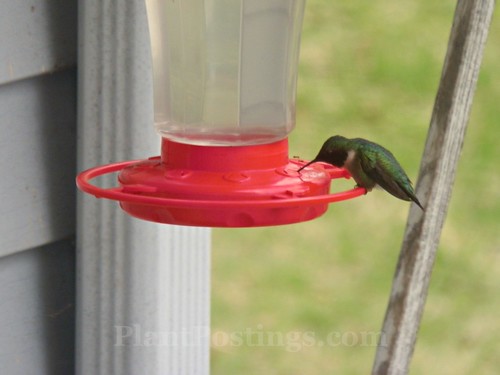
- On the other hand, be ready for the hummingbirds immediately after the first orioles visit. This year, we sighted our first hummingbird visitor on the very next day after the orioles appeared. Which leads to another lesson...
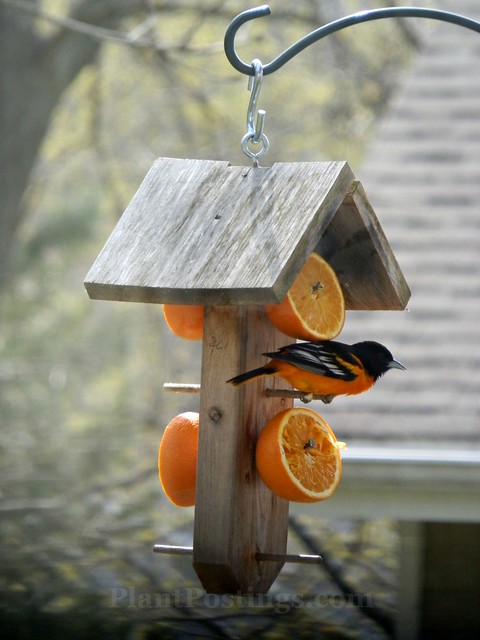
- When you hear that orioles are in the area, put oranges on the feeder. This is the first year I've successfully attracted orioles to the feeder, and it seemed to be because of the timing with migration. For several days, they made repeat appearances--entertaining us outside our dining room window. During the past few weeks I haven't seen any, so I stopped putting out the oranges.
- Try a different technique for overwintering potted plants. (This is kind of a winter/spring lesson.) Very few of the potted perennials that I left outside during the winter survived. Next year, maybe I'll cover them with burlap or bubble wrap and put them in the garage until the real warm weather hits. (Of course, our past winter was particularly brutal, so it's amazing anything survived!)
- Don't be surprised if the Lemon tree loses most of its blooms/fruits before (and when) you move it outside. Apparently, my pollination attempts were inadequate because only a few tiny Lemons remain on the tree. And the move to the outdoor patio didn't help matters, either. I think the poor tree is a little shocked, although it seems to be adjusting now.
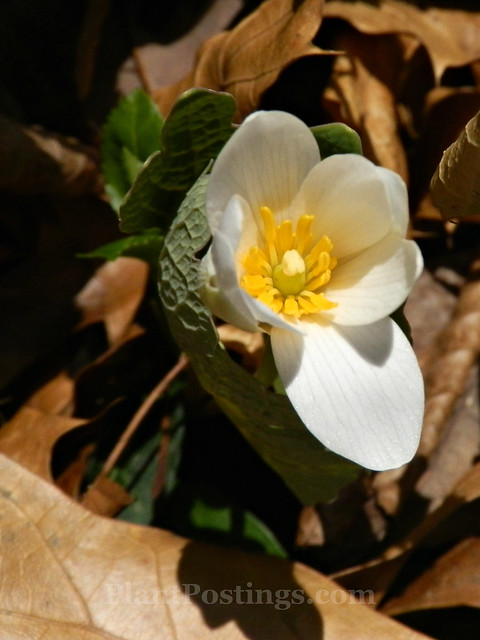
- Don't worry about the native spring ephemerals. The coldest, most brutal winter in this geographical area probably won't kill them off. I didn't really doubt their survival, but it sure was nice to see them when they appeared again.
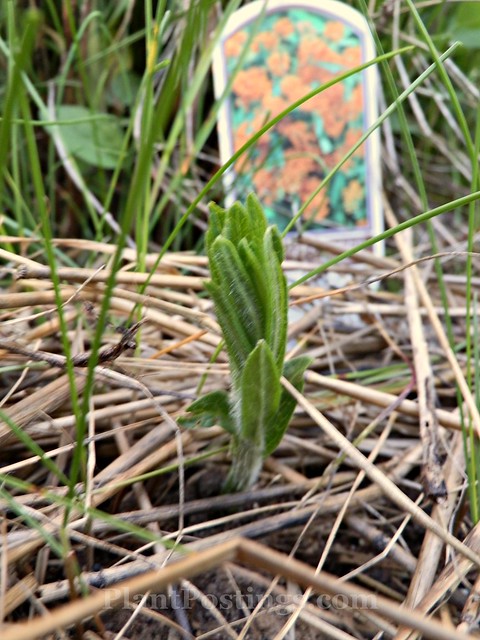
- Never give up on a perennial. (Well, I guess eventually one must give up, when a plant doesn't reappear after a few years, but if it's slow to show up in a particular season, give it time.) Last year, I planted Butterfly Weed (Asclepias tuberosa) and it didn't seem to thrive. It flowered and then died back before it had a chance to form seed pods. But I noticed a new shoot today!
- Use your tried-and-true "lasagna method" on the kitchen garden every year. When the vegetables freeze and the perennials go dormant, spread a layer of Marsh Hay and compost, then a layer of newspaper, and then a thick layer of Marsh Hay on top of the garden (with openings for the perennials). In spring, you'll be rewarded with rich, healthy soil ready for new plants and new growth. (More on this later.)
- Don't worry if the rabbits prune the Dwarf Korean Lilacs (Syringa meyeri) for you. The shrubs will bounce back. But maybe it's a good idea to wrap them in burlap next winter.
- Hunt for morel mushrooms in the same place (not here in my garden, by the way) next year. Enough said. ;-)
Of course there's more, and I could go on. But now it's your turn. If you live in the Southern Hemisphere, what did you learn about your fall garden? If you're in the Northern Hemisphere, how did your spring garden surprise you and teach you new lessons?
Please join in the Lessons Learned meme by sharing a new or a previous post you've written about what you've learned this past season. Feel free to add your link to your comment on this post.
Please also join Donna at Gardens Eye View for the Seasonal Celebrations meme. Posts that cover both memes offer a chance to reflect on the past season and look ahead to the next at the same time. Both memes will be active until the solstice, when we'll post the wrap-ups. Happy summer (or winter to those in the Southern Hemisphere)!
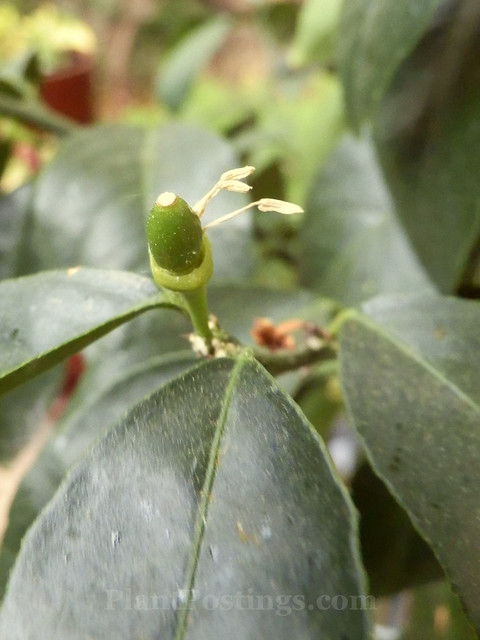
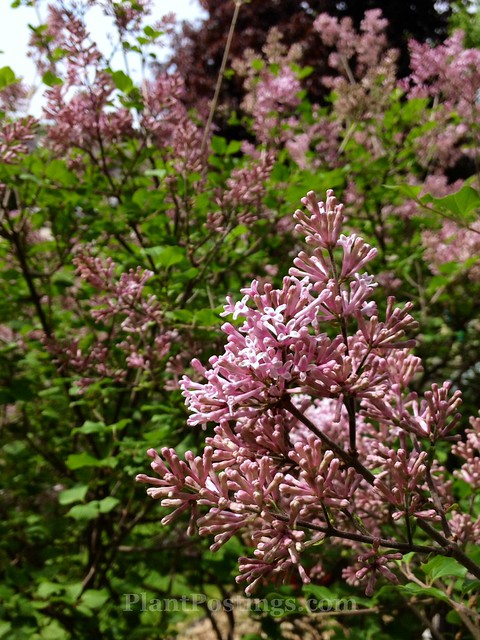
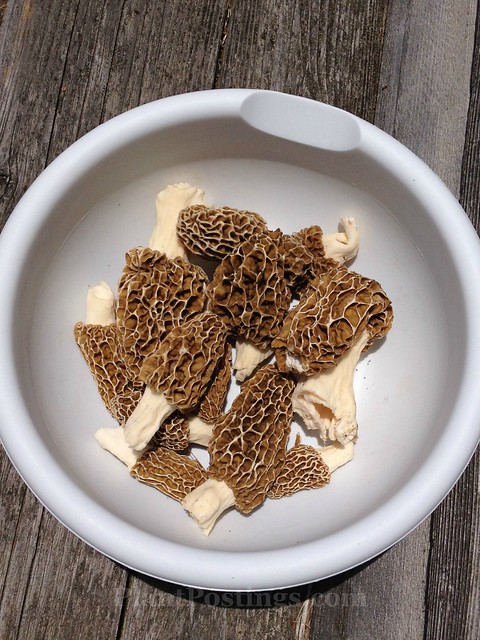
Thanks for hosting the lessons learned again Beth, it is so good to hear about everyone’s experience and tips.
ReplyDeleteThe winter we have past us has been as unusual for us here in UK as it has been for you guys – just in a different way. It rained for 4 months solid and I expected a lot of plants to suffer or even die. My first lesson this spring has been that of all my plants only a few bulbs succumbed to the wet, I must have a much better drainage in my garden than I thought. I had prepared for a mass funeral of plants but my fears were unfounded.
My next lesson and utter joy has been having evergreen, flowering fuchsias throughout the winter and spring. I have never had that before and I am still learning how to deal with them - but how fun! I so wish we could have another frost-free winter but statistically, that’s not likely to happen for a good few years again :-)
I so enjoyed hearing about your Fuchsias making it through the winter, Helene! It's one of my favorite plants, and I put several hanging baskets of Fuchsias out for the hummingbirds each spring. They last until the first hard frost, and I can even bring them inside for a bit to make them last longer. I'm glad to hear that most of your plants and bulbs are just fine after extended rain. I'm sure your garden is at its peak of beauty now!
DeleteInteresting morel. I love mushrooms. But I couldn't find this one here. The shape and color are so beautiful. I'm growing oyster mushroom in my kitchen. But take edible wild mushroom from our own garden is more interesting.
ReplyDeleteHave a wondergul weekend
This is the first time we've found morels ourselves. It's a common and easily identifiable mushroom here. I wouldn't eat any other wild mushroom without consulting an expert first, but these are pretty unique (and very tasty!). How fun to grow oyster mushrooms in your kitchen! I'll have to check into that!
DeleteI knew of the sapsucker/hummingbird partnering for a long while because when hummer come early to claim territory, flowers are rarely in bloom here and many times it is still cold. Those sapsucker holes really are helpful to the early hummers. I only wish rabbits would trim my lilacs. They like the plants that don't grow back for some reason, like the Japanese Maple they girdled. Oh well, I need to encourage them to do pruning my way. LOL.
ReplyDeleteIt makes sense, Donna, doesn't it? I just hadn't heard of it before, and usually haven't seen hummingbirds until mid-May. But this year, maybe partially because I had the feeders out in mid-April, we had our first hummingbird (that I noticed) visitor at the beginning of May. Regarding the rabbits: Believe me, I've had my share of plants destroyed by them, too. Tulips, Clematises, Asiatic Lilies ... too many to list! I hadn't noticed the Lilac shrub damage until a couple of years ago, but last year I had to prune our two dwarf shrubs rather drastically after the rabbit carnage. Neglected to wrap them this past winter, but I hope to get around to it next November (note to self ;-) ).
DeleteI love that you got orioles to visit your garden! They are such pretty birds. I have the same experience with butterfly weed. I kept seeing huge clusters in others gardens and I didn't understand what I was doing wrong. Finally this year I have a good size clump and they are spreading! Patients is not my strong suit!
ReplyDeleteFirst time, Karen! And it was so fun to watch them! My parents have been successful for years, so I don't know why it's taken me so long to figure it out. I wish they would come back. I guess I should periodically put out Oranges? :) I've heard it can take a while with Butterfly Weed, but I just figured mine was beyond hope, since it seemed to go dormant in July. So happy to see it back this year! Fingers crossed.
DeleteWow there was so much to learn and we were on the same wave length regarding birds. My oriole feeder has a spot for oranges, jelly and sweet water which is why the orioles were trying to get at the hummer feeder. They seem to love the sweetened water best and are frequent hourly visitors along with other birds. I will have a post in a couple of weeks about my lessons learned, and I look forward to hearing more about your lasagna method Beth.
ReplyDeleteI remember you mentioning having some of the same birds and experiences with birds! With the orioles, I'm wondering if the new hummingbird feeder near the Orange feeder had something to do with it, too? Several of the orioles drank out of the hummingbird feeder, too. That's fun to watch, as well! Happy Summer, Donna!
DeleteHere is my link Beth...
Deletehttp://gardenseyeview.com/2014/06/09/flower-friends-in-june/
I'd never heard of the sapsucker-hummingbird connection, but it wouldn't help me much, because the sapsuckers don't visit here, or if they do, I wouldn't know them if I saw them:) I wish we had orioles, too! I agree completely about not giving up on a plant--I was positive my new azaleas were dead, but I just hadn't gotten around to pulling them out. Yesterday morning I noticed small green leaves at the bottoms of each one! The story of my azaleas will be part of my lessons learned this spring.
ReplyDeleteI was looking out into the Shagbark Hickory one day in April, and noticed a sapsucker. I did a little research about them, and found out about the hummingbird/sapsucker connection. Of course, then I was very excited because it's pure joy when the hummingbirds return! :) I can't wait to read about your Azaleas, Rose! I don't have any, but I'm a big fan! My mom had a Rhododendron for years that she moved from house to house--and she even managed to keep it alive during many zone 4 winters (when we lived near Green Bay)! Azaleas and Rhododendrons remind me of the Southeast, where they naturally grow so large! Love 'em!
DeleteI learned that cutting back certain plants really hard (Russian Sage, Caryopteris) really does seem to rejuvenate them.
ReplyDeleteOn the other hand, I learned that it really is better not to murder crape myrtles. My un-murdered crapes were fine after a winter that touched -2 Fahrenheit. But many of the crapes that were murdered last fall seem to be damaged or dead this spring.
Ah good, I'm glad to hear your hard pruning has helped some of your plants to come back healthy and strong! I don't know much about Crape Myrtles, so I found your thoughts about it fascinating. I've heard other people talk about "murdering" Crape Myrtles, and it always seemed so unnecessary and brutal to cut them back so much. Glad to hear you found it best to avoid the practice.
DeleteGreat to hear you found some mushrooms in Marquette County! It is true that they do much better where it is sandy. The marsh portion of our property on Hwy 23 between Montello and Princeton has tons of dead or dying elm, but I have only found a total of 2 mushrooms to date there.
ReplyDeleteYes, we did find them near the cottage. ;-) We've often found interesting mushrooms up there before, but never morels--until this spring. So now we know where to look! So tasty sauteed in butter--but then everything tastes great sauteed in butter!
DeleteBe patient with orange milkweed. It's one of the last perennials to emerge in my garden, too. I learned that growing plants under grow lights during the winter is a great substitute for real gardening when it's freezing outside. I've never seen an oriole and have no idea when they migrate through my area. Time to do some research. I learned that even if I cut a rose back by 95%, it will still come back. Yay!
ReplyDeleteGood to know about Orange Milkweed! Seriously, I thought the plant was dead when it shriveled up last July. You've had amazing success with indoor seed-starting, Tammy. That's great! I usually cut my Roses back pretty liberally here in Wisconsin, because the winters are so tough--then the snow covers the entire plant and they come back just fine in the spring. Roses are amazingly resilient when planted in good soil, the right zone, and the appropriate lighting. But you know all that--your Roses are incredible!
DeleteGood advice about perennials. I seem to have great difficulty learning this. They die back or disappear, and I'm sure they've gone forever. There's nothing quite like the thrill of noticing a tiny green shoot as the plants wake up and come back to life.
ReplyDeleteThose bird species are quite different from our birds here, but I found what you wrote about them, fascinating. That lasagna method could also be good for smothering weeds, I think.
What a lot of learning you have been doing, Beth. I've had thoughts, whether I'll manage to organize them into a post in time remains to be seen (or read).
Yes! It is, indeed, a thrill! It has been a great season for learning, Sue! And I didn't even include everything. Every season has new lessons in the garden. It might sound trite, but it's true--for me anyway.
DeleteLessons Learned is a wonderful Meme . . . I learned . . . and will try the lasagna method for a new garden I have been working on . . .
ReplyDeleteI wish I had something to offer . . . other than learning that this was a dreadfully hard winter on our landscape and many plantings I haven't much add. Other than I am learning "patience!"
Yes, it was a tough winter! It's making this perfect weather so appreciated! I keep thinking of other things I learned, but some of them are difficult to put into words. ;-)
DeleteI always have lessons in my head and plans to do them, but if you're an absentee gardener like me; e.g. garden at home in the province, but am living in the big city far from home, these will surely not materialize. But everytime the seasons changes, i always have lessons and plans again. They go on and on for years, until i don't know when. By the way, i love the tall trellis on the post before this, i think it will go favorably with my hoyas, haha!
ReplyDeleteOh, glad you like the obelisk! I like it, too. The Golden Hops I had planted there last year didn't survive the winter, so I added Hyacinth Bean vine this year, and it seems to be taking off. I know what you mean about having lessons in your head--happens to me, too. ;-)
DeleteWish we had morel mushrooms around here. Also, glad your butterflyweed made it through the winter. It's true you shouldn't be too quick to conclude something has died.
ReplyDeleteFirst time we've found morels in this particular spot (near our cottage north of here). It was a big surprise, believe me. Of course, we've never looked in that spot before but we will now. The Butterfly Weed is about to bloom!
DeleteThat's encouraging about the butterfly weed. I will have to take a closer look to see if my plants are coming back. But I'm still a little conflicted about growing the tropical milkweed. I probably should be planting our native milkweed instead, if I can ever find a seed source!
ReplyDeleteYes, and it's just about to bloom now! What a quick turnaround! Dorothy: If you lived closer, I'd mail you or deliver some seeds. But I think you're supposed to try to get them from local sources. Which Milkweeds are native to your area?
DeleteI too have learned the lesson about the Asclepias. They are slow to emerge. I thought I lost my A. speciosa but I was watching a pot boil. When I stepped away and let my ADGD (attention deficit gardening disorder) take over, I saw life and did the happy dance. Now the plant is a foot tall! Yay.
ReplyDeleteThe Butterfly Weed seemingly popped up out of nowhere in late May, and now it's about ready to bloom! You're right--I need to stop "watching the pot boil." I have the same issues. ;-)
DeleteI've noticed that many perennials were slow to emerge this year, poor babies that cold winter was hard on them. Oranges for Orioles....I'm going to try it.
ReplyDeleteJen
Yes, weird year after the horrible winter. I hope we don't have another winter like that for a lonnngggg time. If so, I plan to spend some time in the south. ;-)
DeleteI don't remember which day is actually the Summer Solstice--the 20th or the 21st--but my post will be up tomorrow, June 21st. So much of what I've learned this spring is actually a carryover from the hard winter!
ReplyDeleteLooking forward to it, Rose! The wrap-up will happen a couple of days late this time, but will be my next post. :) Thanks for joining in!
Delete